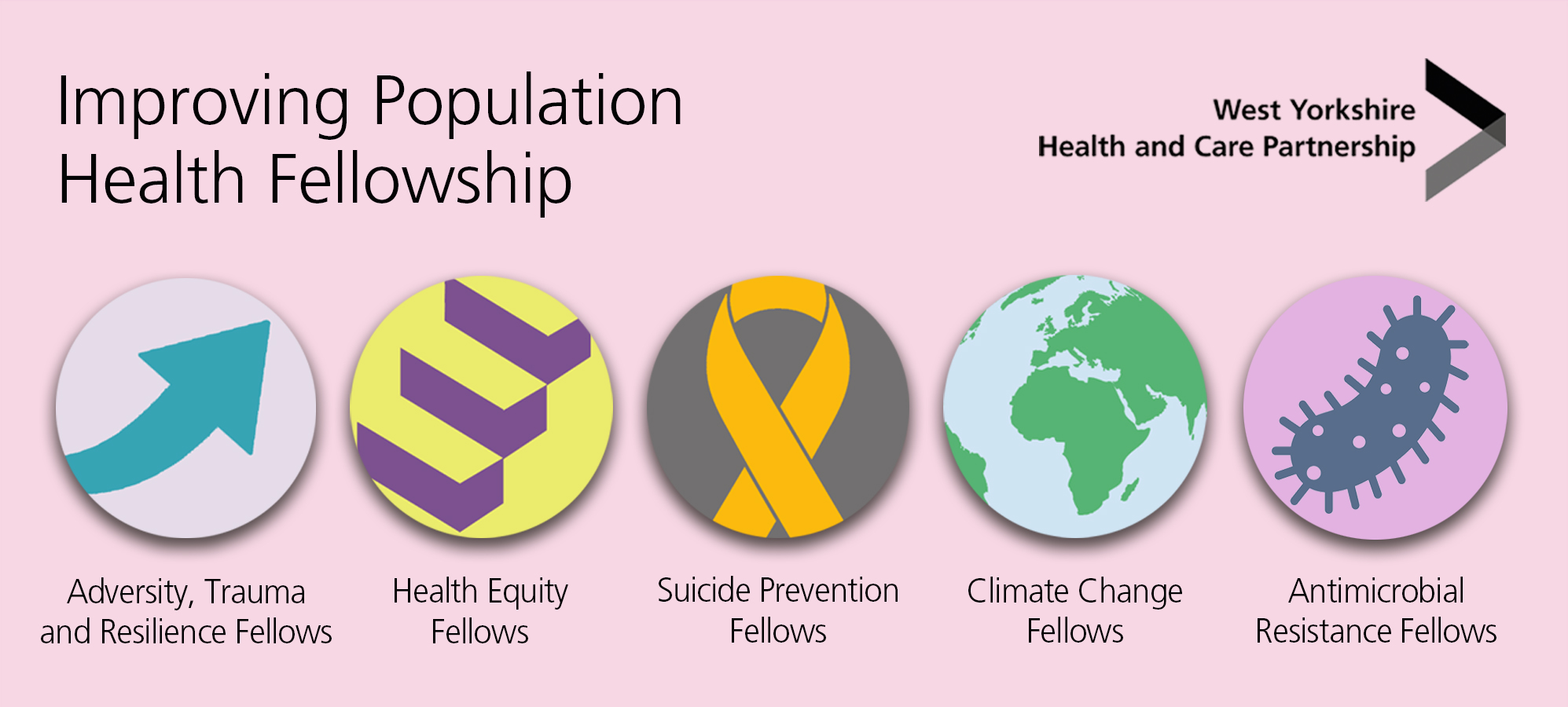 Improving Population Health Fellowship
Improving Population Health Fellowship
In 2021 we launched the Partnership’s first Health Equity Fellowship, part of the West Yorkshire Health and Care Partnership Health Inequalities Academy and appointed 33 fellows who carried out projects to support our work to tackle health inequalities and help make West Yorkshire an equity-informed system. Those projects are making a positive difference to people’s lives. You can read more about those projects on our class of 2021/22 page.
2023 cohort
For 2023 we expanded the fellowship to cover other areas of the Improving Population Health Programme and appointed 52 fellows to join us in the following areas:
- Health Equity (23 Fellows)
- Adversity Trauma and Resilience (21 Fellows)
- Suicide Prevention (three Fellows)
- Climate Change (five Fellows)
Meet the Improving Population Health Fellows for 2023 and read about their projects.
2024 cohort
For 2024, we expanded the fellowship once again and recruited fellows covering the following areas:
- Health Equity (30 Fellows)
- Adversity Trauma and Resilience (30 Fellows)
- Suicide Prevention (five Fellows)
- Climate Change (five Fellows)
- Antimicrobial Resistance (five fellows)
The class of 2024 runs between 1 April 2024 and 31 March 2025. Find out more about the Improving Population Health Fellows for 2024.
2025 cohort
Applications for the 2025 cohort closed on 14 February 2025.
See the information pack for fellow applicants. A text only version of the information pack is also available.
Fellows dedicate one day a week to the fellowship in which you will:
- attend training and meetings
- work on a project bespoke to your chosen fellowship theme
- deliver your project in your usual place of work or join up with a system-wide initiative taking place in West Yorkshire
Training and meetings will be either face to face or delivered online using Zoom or MS Teams. You will be expected to attend these gatherings, so you'll need to travel and be able to access a device and an internet connection.
On these pages you can find out more about becoming a fellow, the personal and organisational benefits and the application process. We've also recorded an introductory session held for last year's cohort and a recording from an induction session held for the class of 2023. A text only version of the information pack is also available.
We are looking for mentors and project ideas for future fellows. If you have a project idea for a fellow, please fill in the project proposal template and return it to paula.sherriff1@
The benefits
Benefits for organisations
Fellowships will:
- provide the opportunity to change behaviour, empower employees, and build authentic relationships with networks and partners across West Yorkshire
- support professional and personal development, with no cost to the employer
- meet the shifting needs of employees and organisations together with the communities we serve
- give fellows the confidence, insights and motivation to expand or extend work in their chosen area
- bring new ideas, tactics, and perspectives
- contribute to the future success of the organisation in a specific area
Benefits for fellows
As a fellow you will:
- gain valuable experience and learning under the guidance of mentors and experts
- receive guidance, institutional support and professional development
- gain practical knowledge and learning from your experiences and be able to embed that learning across West Yorkshire
- get free Foundation Programme in Public Health training delivered by Health Education England and the University of Leeds
- be able to access bespoke training in your chosen area as well as access to the Improving Population Health Programme areas of work, for example: Health Inequalities Academy and Network, Adversity Trauma and Resilience Programme, Suicide Prevention Programme, Climate Change Programme and Prevention Network
- expand your professional networks through engagement with other fellows and exposure to experts, programmes and organisations pioneering positive change
- build relationships with colleagues working in our five places - Bradford District and Craven, Calderdale, Kirklees, Leeds and Wakefield
- be able to publish details about your fellowship projects on our website and partner websites
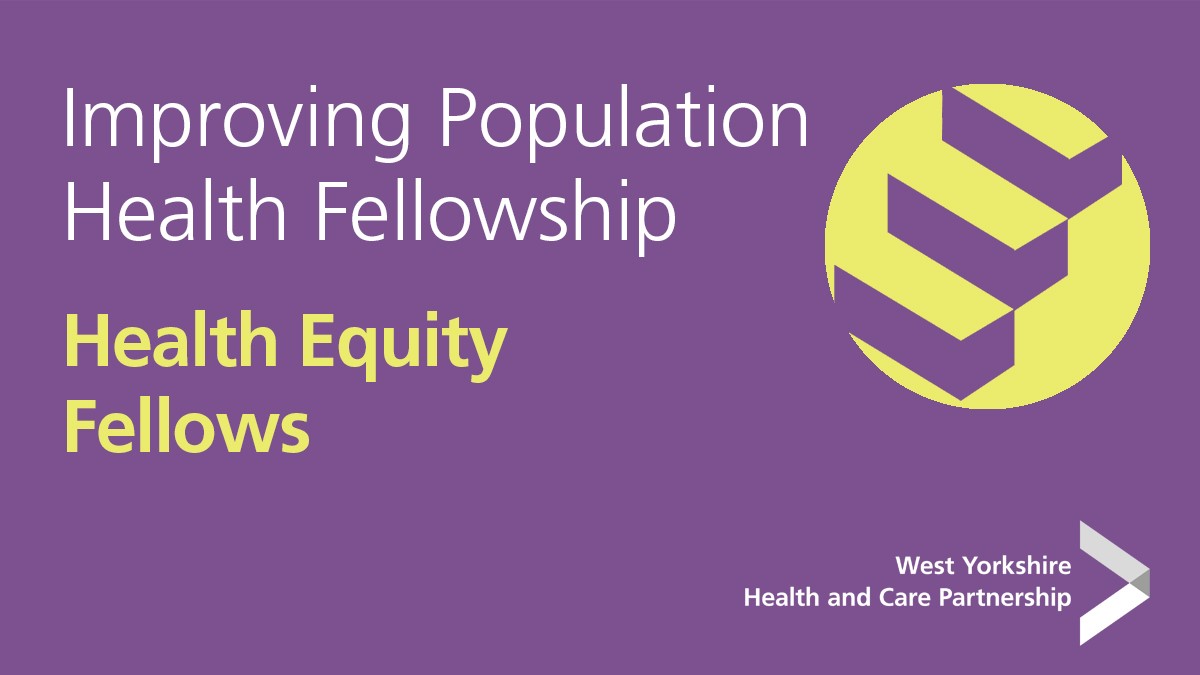 Health Equity Fellows
Health Equity Fellows
Objectives
- Identify and respond to health inequity and inequalities
- Build equity and inequalities champions across West Yorkshire
- Create a health equity fellow peer network
- Share learning and best practice
Health Equity Fellows are part of the West Yorkshire Health and Care Partnership Health Inequalities Academy, working towards the ambition to equip all staff with an understanding of the individual and collective action we can take to create a more equitable health and care system.
Addressing health inequalities requires a whole system approach from strategic planning and leadership to community level service delivery. Health Equity Fellows will understand the foundations of health inequity and have the knowledge, skills, and courage to build more equitable organisations and communities.
Health Equity Fellow applicants, please contact: paula.sherriff1@
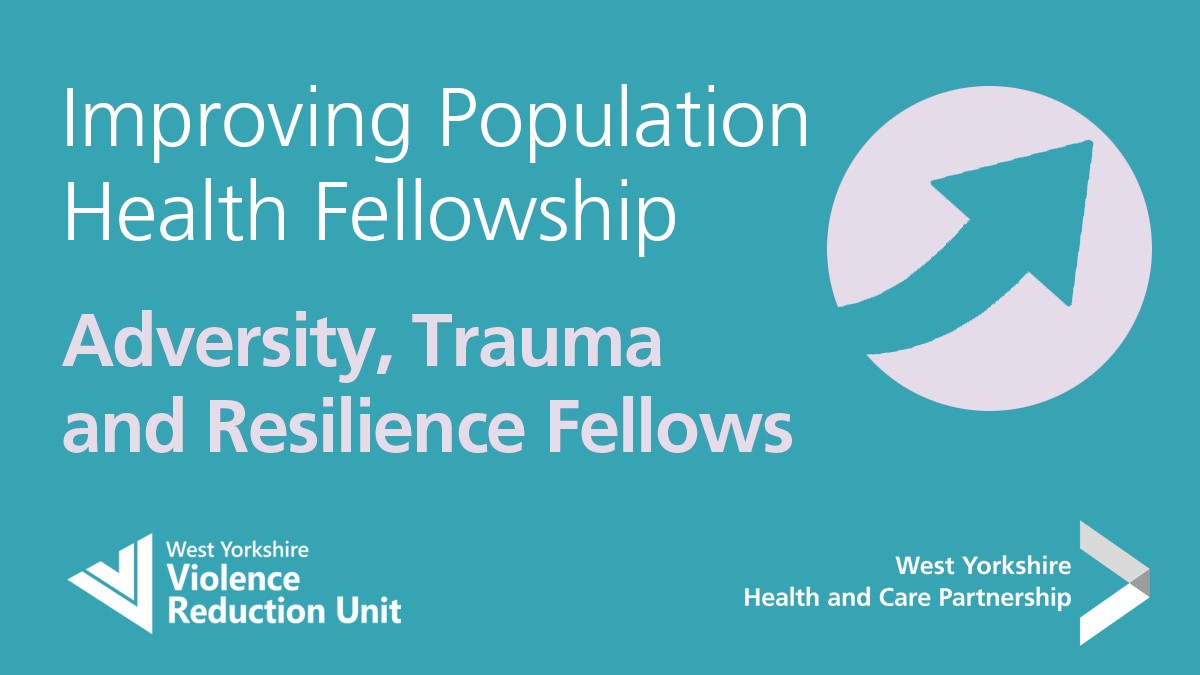 Adversity, Trauma and Resilience Fellows
Adversity, Trauma and Resilience Fellows
Objectives
- Identify and respond to adversity, trauma and resilience
- Build trauma informed champions across West Yorkshire
- Create an adversity, trauma and resilience fellow peer network
- Share learning and best practice across West Yorkshire
Adversity, Trauma and Resilience Fellows will support our ambition of being trauma informed and responsive by 2030. This includes supporting colleagues to gain and develop an understanding of the individual and collective action we can take to create a more trauma informed system. Fellows will understand the foundations of adversity, trauma and resilience and have the knowledge, skills, and courage to help build more trauma informed organisations. See the West Yorkshire Knowledge Exchange to find out more.
Principles
Trauma informed organisations offer:
- cultural, physical, relational and emotional safety
- trust and transparency
- peer support and mutual self-help
- collaboration and mutuality
- empowerment, voice and choice
- culturally responsive services
Adversity Trauma and Resilience Fellow applicants, please contact: caroline.andrews16@
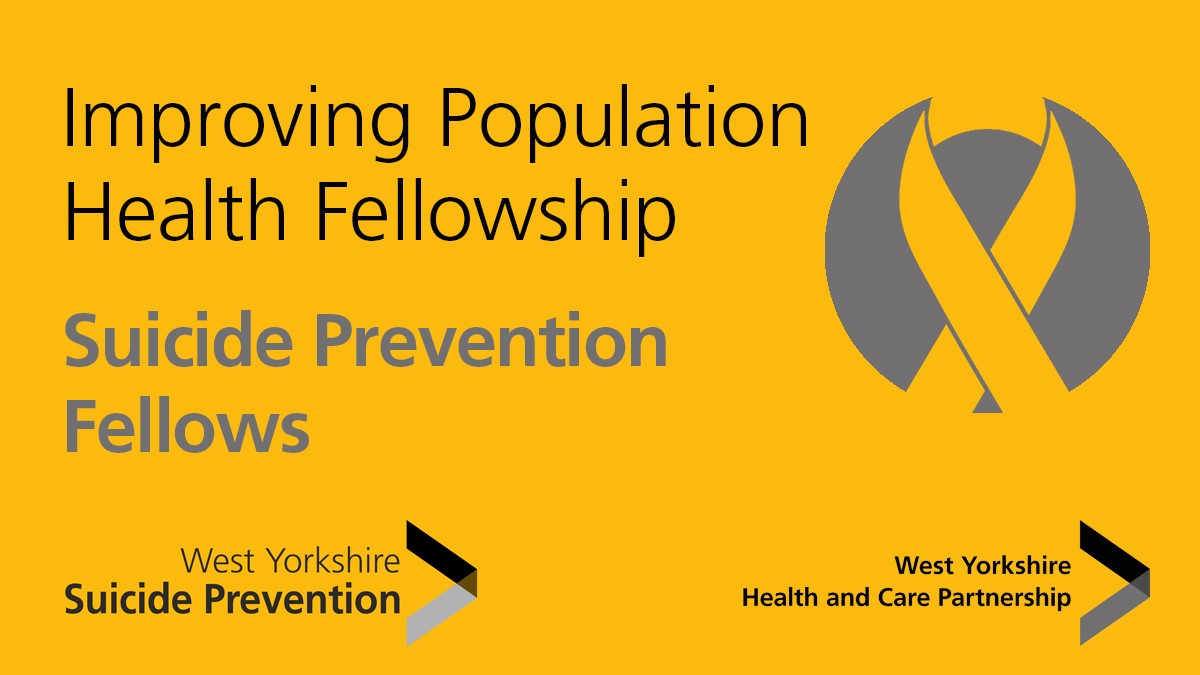 Suicide Prevention Fellows
Suicide Prevention Fellows
Objectives
- Work collaboratively to create a movement for change
- Build suicide prevention champions across West Yorkshire
- Share learning and best practice
*Trigger warning – the following information discusses suicide and suicide bereavement*
Our ambition is to reduce suicides by 10% across West Yorkshire.
The latest information from the Office of National Statistics (ONS) shows that Calderdale, Kirklees, Leeds and Wakefield all have suicide rates that are higher than the England average. In West Yorkshire in 2021, there was an average of 5.4 suicide registrations at coroner courts in West Yorkshire each week. Suicide is our biggest killer of men under 50 and our biggest killer of young people.
Suicide is complex, but across West Yorkshire we have pledged to take a zero suicide approach and believe that suicide is preventable. See our Suicide Prevention Strategy and our suicide prevention website for more information.
In addition to the benefits offered to all fellows, we will:
- support you, provide regular supervision and guidance – you will be part of our team and part of a growing movement of people motivated to reduce suicide across West Yorkshire
- provide one-to-one and small group training on suicide and health inequalities
- ensure access to online suicide prevention training as well as in person training delivered by Papyrus
Suicide Prevention Fellow applicants, please contact: sally.lee9@nhs.net if you need more information.
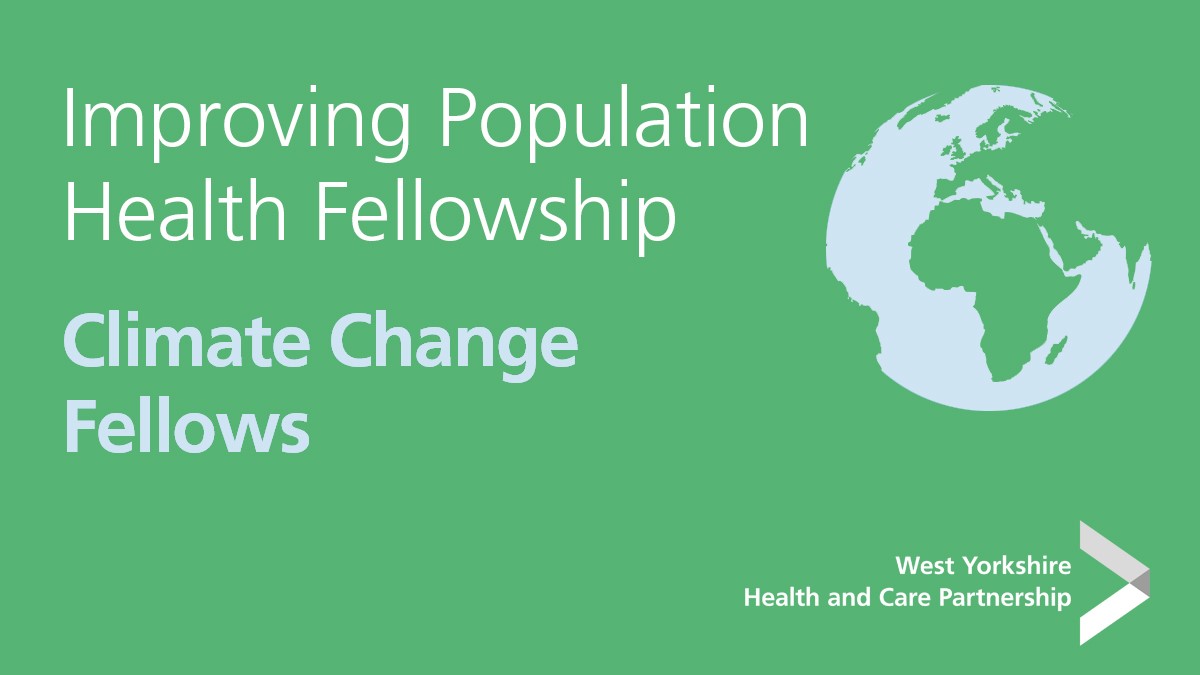 Climate Change Fellows
Climate Change Fellows
Objectives
- Reduce the environmental impact of health and social care in West Yorkshire
- Build climate and sustainability champions across West Yorkshire
- Share learning and best practice
The NHS accounts for approximately 5% of UK carbon emissions and as climate change gets worse, more people will need healthcare. We therefore have a practical reason, as well as a moral imperative, to do what we can to reduce our environmental impact.
If you would like to join our team of positive, knowledgeable and dynamic people to reduce the environmental impact of health and social care in West Yorkshire, we want to hear from you.
We have a list of suggested climate change projects but we are also happy for people to bring their own ideas. See our climate change pages for more information about our work.
Climate Change Fellow applicants, please contact: maria.storer@nhs.net if you need more information.
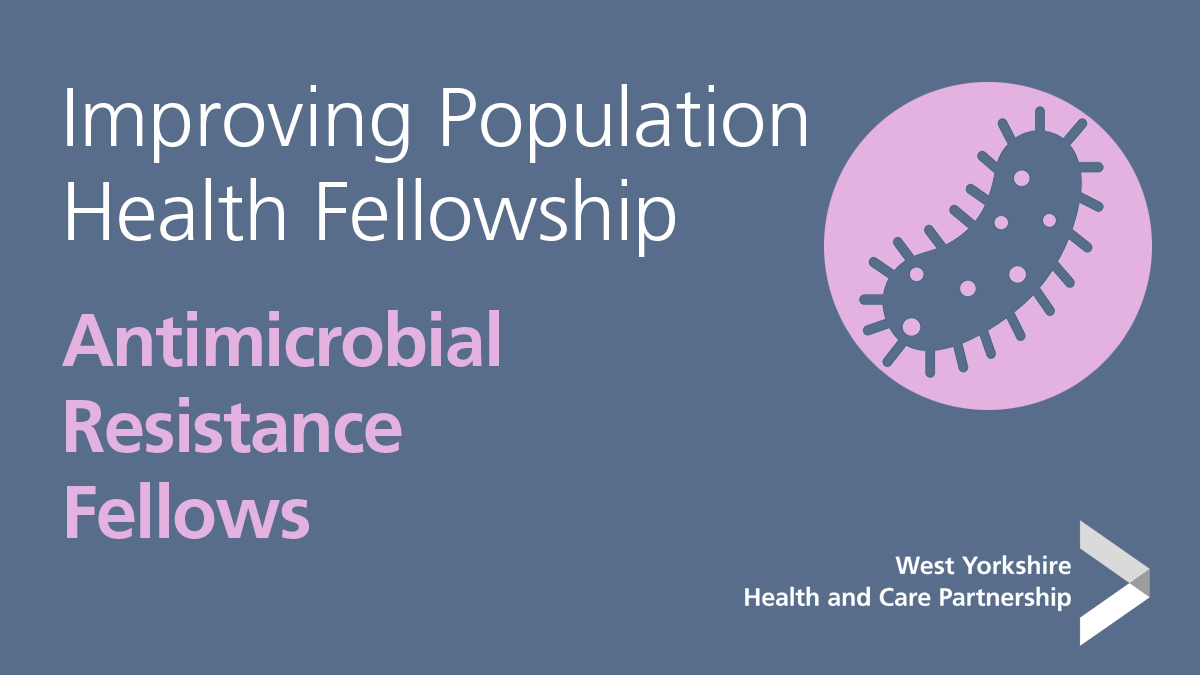 Antimicrobial Resistance (AMR) Fellows
Antimicrobial Resistance (AMR) Fellows
Objectives
- Reduce AMR and inequalities related to infections
- Reduce the number of urinary tract infections (UTIs) across the system
- Reduce inappropriate antibiotic prescribing
- Antimicrobial and infection prevention sustainability
- Learn from Covid-19
Our AMR programme is about protection: protecting the environment to prevent AMR, protecting our citizens from infection and protecting antibiotics with appropriate prescribing (not always less), so that they will be there for us in the future.
As an AMR Fellow, you will join the AMR steering group. You’ll be supported by a group of professionals from across the system, who are working together to deliver the goals set out in the current AMR National Action Plan whilst building local resilience, and readiness, for the health threat that is AMR for our citizens in West Yorkshire.
We have many suggestions for projects you might consider, from behavioural change, environmental challenge and health education to infection prevention, diagnosis and effective, timely treatment. We also greatly encourage fellows to bring their own ideas.
We would love for you to join us in supporting our ambition as we develop our next strategy and lead the way in the crusade against resistance.
For further information about our vision see our AMR animations
AMR Fellow applicants, please contact sarah.chadwick9@
Foundation Programme in Public Health
The Foundation Programme in Public Health, designed by the Yorkshire and Humber School of Public Health aims to help health and social care colleagues improve knowledge and understanding of health inequalities to better support population health initiatives.
Programme benefits
- Foundation level knowledge and understanding of health inequalities
- Improved understanding of how current specialisms can be adapted to address health inequalities
- Improved understanding of how emerging population health policies can address health inequalities
- Improved understanding of how system-wide working can address health inequalities
- Improvement in the overall number, quality and impact of health promotion, protection, or prevention initiatives
See the Foundation Programme for Public Health website pages for more information.
Email: FPPHqueries
Who should apply?
The Improving Population Health Programme Fellowship is designed to bring together the diverse organisations and professionals that influence health and wellbeing, attracting applicants that are representative of the communities we serve. The Fellowship is open to all primary, secondary, community and voluntary sector colleagues across West Yorkshire irrespective of your current job role, grade or profession. There are no specific educational requirements.
To apply you will:
- be passionate about your specialist area of choice – see the relevant sections above
- want to become a champion and achieve change
- be committed to the delivery of a fellowship project
- agree to carry out formal learning as part of the fellowship
- confirm prior support from your current organisation that you will have protected time to take part fully in the fellowship
How to apply
To apply you will need to fill in this statement of interest form. Alternatively, you can submit your expression of interest in another format such as video or audio.
In your statement of interest, please include:
- your name, contact details, current role and organisation, location and ethnicity
- a little bit about you and your personal motivation for applying
- the challenges you see in your current role and how you would seek to expand your learning and experience to address these through the fellowship
- relevant work, voluntary and community experience and contributions, and how this will support you in your fellowship
- how you plan to continue to develop your knowledge and skills after completing the fellowship
- initial idea for a fellowship project
- confirmation of support from your employing organisation and your line manager
Applications for 2025 run from Wednesday, 13 November 2024 until Friday, 24 January 2025.
Send your completed statement of interest form to iphp.fellowshipenquiries@nhs.net.
Selection criteria and process
We will also seek to recruit fellows from across West Yorkshire that reflect a variety of professional backgrounds and are representative of the communities we serve.
During the selection process we will consider:
- demonstrated prior commitment and passion in your chosen fellowship programme
- how you will help improve outcomes for people who live and work in West Yorkshire
Selection panels for each area will score applications against the following criteria:
- strength of statement of interest including your personal motivation and commitment to your chosen fellow area
- how you will continue to apply learning following the fellowship in your workplace or community
- quality of your proposed fellowship project
- confirmation of support from your line manager
You may need to attend an interview if fellowships are oversubscribed.
Mentoring
We are also on the lookout for public health trained mentors and project ideas for the next cohort of fellows. As a mentor, you’ll provide support and guidance for fellows during their time on the programme from 1 April 2025 to 31 March 2026. You’ll also guide your fellow in refining, delivering, and evaluating their project through regular 1:1 meetings and feedback on their written, interim project report.
You will be fully supported throughout the fellowship programme during this process, with quarterly group meetings and individual discussion. There will be optional training and development opportunities throughout the year, and the chance to join our community of practice with past and current fellows and mentors.
If becoming a mentor is something you are interested in, please complete the expression of interest form and return it to iphp.
Questions and answers
Is the fellowship open to volunteers?
Yes, we welcome applications from all partners from voluntary, community and social enterprise (VCSE) organisations.
Can I apply if I run my own project and don’t have a line manager?
Yes, just sign the application on behalf of yourself.
I can't find the application, where is it located?
Please see the ‘how to apply’ section on this page.
Why is the scheme only offering a limited number of places to participants?
We are limited by training place numbers, mentors and supervisory capacity, so we have based numbers around what each programme can support.
Will the fellowships provide adjustments and accessible information?
We have a duty to make sure the information and publications we produce are accessible. If you apply and need additional support, then we will make sure we can do what we can to meet your needs.
The training providers are also committed to accommodating any accessibility requirements and any specific needs you may have. We will discuss this in advance so we understand what is required.
Does the programme provide funding for backfill?
We are unable to provide backfill funding for statutory organisations. Funding may be available to support applications from the VCSE sector to backfill time for successful applicants.
Who would fund any required project costs?
Additional funding is not currently available to cover fellowship projects. When agreeing projects, we will take resource into consideration and where this may come from. Many projects will need to be cost neutral or about reinvestment.
Are the costs to cover the fellowship day a week paid for by the scheme or the department/organisation the fellow has come from?
Your employer will need to pay your salary costs. That means you will need to get the backing of your employing organisation and line manager before you apply.
What are the costs associated with the fellowship?
There is no cost required to be a fellow or for any of the support and training provided. The costs for your organisation will be related to releasing you for one day a week to undertake the programme, project, and training. Travel to and from meetings is at the fellow’s expense.
How much time will the fellowship take?
The fellowship will run for 12 months. You’ll need to spend one day a week on fellowship training and on delivering a fellowship project.
Is it confirmed what day fellows need to take and does it have to be on a day I would be employed on by my employer?
Days will, on the whole, be flexible. For dates that are set, we’ll give you notice in advance. It does not have to be an employed day.
What constitutes one day a week?
Seven and a half hours is a working day.
How many cohorts are you planning?
We expanded the fellowship for year 2 and 3 based on the success and feedback from our year 1 fellows and intend to continue on an annual basis.
How will you incorporate people working part time?
There is an expectation for all fellows to carry out a project as part of the fellowship, regardless of whether you work full or part time. However, if you have any specific requirements, we will discuss these with you and how that fits in with your working day.
Can the focus of projects be on workforce or is the focus just on population?
You can focus your projects on any population you choose or work with. We are happy to help successful applicants work through projects. If applicants have an idea and just want to test it out with us, then we are happy to do so. Have a look at projects ideas submitted for the class of 2023 on our meet the fellows page.
Will you publish and share learning and information from projects?
Yes, we will publish projects on our websites and evaluate the fellowship. You can see the project reports from the 2022 cohort of fellows on our health equity fellows page.
Should the project be at organisational level or departmental level?
You can focus your projects on any level or part of an organisation.
Do I have a say in which project to take part in?
Yes, you will be asked for your project ideas as part of your application. However, we will support you to refine and develop your project once selected to the scheme.
Would there be a possibility to publish projects, for example, as a journal article if my employer is willing to pay the costs?
Yes, this would be a possibility. We’ll also publish projects on the Improving Population Health Programme webpages. Projects may also form part of a case study or short film.
What does the Foundation Programme in Public Health course work look like?
You will need to take part in the Foundation Programme in Public Health which covers key topics and ideas, and will help you develop fellowship projects. There are four training sessions covering a range of public health skills. Training sessions will include teaching, but you will also be expected to participate in group work as well in every session.
All fellows will need to carry out training and attend a minimum of three of the four sessions. If you attend all four public health training sessions, you’ll receive a certificate from the University of Leeds highlighting learning outcomes. You will also gain continuous professional development (CPD) credits that you can use in your personal development plans or equivalent.
Will there be any other training outside of the Foundation Programme sessions?
Yes, there will be bespoke training for each of the different fellowship programmes. In addition, you’ll also have the option of attending trauma-informed training from Dr Warren Larkin.
We welcome requests for any other training you think might help with your project and learning.
Will there be any report writing?
As part of your fellowship project, we expect fellows to complete an interim report halfway through the fellowship and a final report at the end. Your mentor will assist you with these reports, provide feedback and we will provide guidelines. There is flexibility if a written report is not for you.
Who do I contact for more information?
- Health Equity Fellow applicants, please contact: paula.
sherriff1 @nhs.net - Adversity Trauma and Resilience Fellow applicants, please contact: caroline.robinson13@nhs.net
- Suicide Prevention Fellow applicants, please contact: richard.james14@nhs.net
- Climate Change Fellow applicants, please contact: frank.
swinton @nhs.net - Antimicrobial Resistance Fellow applicants, please contact sarah.chadwick9@
nhs.net - On the Foundation Programme in Public Health, please contact: FPPHqueries
@barnsley.gov.uk
For general enquiries, please contact caroline.
Feedback from other fellows
Here's a snapshot of what previous fellows have said about the fellowship.
Emma Pears said: "Being a Health Equity Fellow has helped me use my lived experience alongside the knowledge gained through the programme to bring about tangible change for the children and young people I work with. It's enabled me to see the work I do through a different lens and how someone like me can bring about systemic change." See Emma's report Improving Children's Mental Health in Rural Craven for more information about Emma's project.
Cathy Chadwick-Rayner said: “The health equity fellowship has been a great opportunity to learn about public health (via the Public Health Practitioner programme), and the various teams who are working to help people live healthier, happier lives. The connection with other fellows was also fantastic as it was revealed just how many different kinds of roles are involved with improving health equity. It was also lovely to meet with like-minded people, who inspired and supported me along the way.”
Issy Simmons said: "I’m loving the Fellowship - the learning and connections it is bringing to assist with our outreach work on breaking down barriers is fabulous."
Aziz-ur Rehman, said: “This is the first time I have been valued for my overall knowledge around the wider health agenda and I felt totally comfortable with every aspect of the fellowship. It is certainly not there to trip you up but to nurture what you have and make it useful for the wider community. I would recommend it to anyone trying to ‘think outside of the box’ and it is up to you what you get out of it as I certainly got a lot out of it.”

